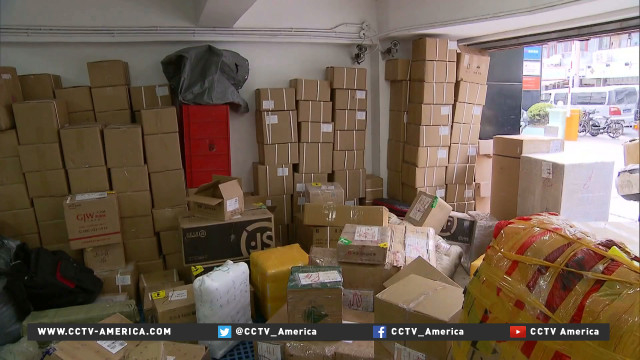China’s online retail market is growing rapidly and hits one of its annual peaks during the Spring Festival. Convenience and fast food delivery are an important part of that growth. Most big B2C e-commerce companies, like JD.COM and Amazon, have built their own delivery services. This makes them less dependent on delivery firms, but it costs them a lot of money. CCTV’s Hu Xiaocen filed this report from Beijing.

Chinese e-commerce companies pushing delivery services during Spring Festival
China's online retail market is growing rapidly and hits one of its annual peaks during the Spring Festival. Convenience and fast delivery are an important part of that growth. Most big B2C e-commerce companies, like JD.COM and Amazon, have built their own delivery services. This makes them less dependent on delivery firms, but it costs them a lot of money. CCTV's Hu Xiaocen reported the story from Beijing.More and more, people are shopping online for New Years gifts. However, the orders come so quickly that some Taobao vendors have warned customers to avoid delivery delays and order early.
“I’ve already noticed the delays, and won’t be buying anything online if I need it immediately,” customer Yu Chenjia said.
As a result, many people who would normally shop online are now going offline for their needs.
“If the delivery service is slow, that will impact my shopping. I’ll go out to a store to do my shopping,” customer lv Yanzhen said.
Though delivery firms are required to provide year round delivery service, couriers are mostly migrant works who work in big cities and go back to their hometowns during the two weeks of Chinese New Year celebrations with many planning to stay home for up to a month.
One courier from the leading delivery firm SF Express told CCTV that even with the offer of higher pay, only one-fifth of the workers at his delivery station will stay on the job. This creates a problem for online vendors like Taobao, who do not have their own delivery service.
Competitors, such as JD.com or yhd.com, who do have their own delivery services are looking to have a competitive edge in the online commerce business during the Chinese New Year’s traditional shopping season.
“We prepared all the distribution staff we will need, one or two weeks ago,” Liu Xinyang, Director of Distribution for yhd.com said. “We will be able to deliver goods to customers during spring festival within three hours in the downtown areas of Shanghai and Beijing via our special delivery service as long as they order before 4pm.”
Maintaining these delivery services is neither easy nor cheap. JD.com, for example, spent 2.2 billion yuan (about $350 million) on its delivery service during the third quarter of last year, according to the company’s financial reports. Liu Jianlin, who has been studying the logistics sector for 8 years told CCTV that running their own logistic systems involves high costs for e-commerce businesses.
“Warehousing, sub packaging, and distribution costs amount for 90 percent of the total cost. Integrity of delivered goods determines the online shopping experience,” Associate Professor Jianlin of the Shanghai Logistics Institute said. “Outsourcing deliveries make it difficult to guarantee that. So the e-commerce giants have established their own delivery services to make sure goods arrive intact, correctly and are paid for promptly.”
The number of China’s online shoppers reached 310 million last year. E-commerce consulting firm iResearch says that represents a 48.7 percent rise in transaction volume to 2013.
 CGTN America
CGTN America
